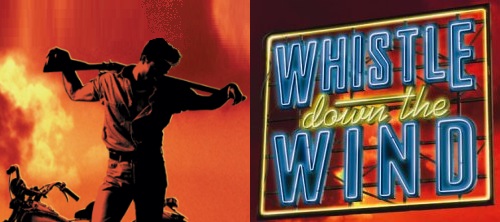
Un groupe d'enfants menés par la jeune Swallow, découvrent dans une grange, un homme évanoui, blessé aux mains et au torse. Pour les enfants, cela ne fait pas de doute, il s'agit de Jésus de retour sur
Terre pour les sauver. Ils décident de garder le secret et de le soigner, alors que les adultes de la
petite ville recherchent activement un dangereux tueur évadé.
Acte I
Le spectacle commence dans une petite église en Louisiane. Nous nous joignons à l'action au moment où la congrégation est sur le point de chanter une chanson (The Vaults of Heaven). Après la chanson, le prédicateur conclut son sermon, et l'assemblée se disperse. Nous voyons les enfants courir et jouer (Overture). Nous rencontrons la jeune Swallow (16 ans), sa jeune sœur Brat et son jeune frère Poor Baby. Pensant à la Noël qui approche et qu’ils passeront sans leur mère, ils se plaignent de ne jamais obtenir ce pour quoi ils prient (I Never Get What I Pray For). Ils rencontrent Ed, qui est sur le point de noyer des chatons. Swallow réussit à les sauver mais les enfants se rendent compte qu'ils auraient dû être à la maison depuis longtemps (Home By Now ).
Sur le chemin du retour, ils rencontrent Earl qui recherche un endroit où installer une tente pour une réunion d’éveil, où les gens vont danser avec des serpents afin de tester leur foi en Jésus. De retour à leur domicile, leur père Boone tente de les convaincre qu'il ne peut pas trouver mieux que ça (It Just Doesn't Get Any Better Than This), avant de rappeler ce que sa femme avait coutume de dire: Whistle Down The Wind. Mais comme l’affirme Poor Baby : «M’man le chantait mieux».
Dans la grange, Swallow chante une reprise de Whistle Down The Wind alors qu’elle prie que Dieu protège les chatons. Elle est surprise de découvrir qu’un homme se trouve dans la grange et elle lui demande qui il est. Quand il répond : «Jésus-Christ», elle est persuadée d’avoir rencontré le sauveur. Elle présente son frère et sa sœur à l’Homme et ils promettent de ne rien dire à personne (The Vow).
La scène se déplace dans un bar où Ed chante Cold pour divertir les habitants. Le shérif arrive au bar pour avertir la ville qu'il y a dans la région un tueur en cavale, et qu'il pourrait se cacher à proximité. Nous revenons dans la grange où l'homme se réveille entouré d'enfants cherchant Jésus. Tous promettent de prendre soin de lui et de garder son existence secrète. Resté seul, il pense qu’il reste des choses à régler (Unsettled Scores). Plus tard cette nuit-là, Swallow lui apporte de la nourriture, et lui demande si il lui rendra sa mère: «Étant le Fils de Dieu, cela ne doit pas être si difficile pour vous!» Elle chante : si seulement les choses qu’elle désire pouvaient se réaliser (If Only).
Nous rencontrons Candy, une jeune fille noire, et Amos, un garçon blanc, qui chantent le bonheur de sortir de la ville où ils vivent, et de se retrouver dans un endroit où ils peuvent être à l'abri (Tire Tracks et Broken Hearts). Les habitants de la ville chantent ce qu’était leur ville (Safe Haven).
Les enfants discutent de ce que cela signifierait si l'homme mystérieux était vraiment Jésus-Christ, et quelle différence cela ferait dans leurs vies (Long Overdue For A Miracle). Ils se rendent compte que si ils font tout ce qu’il faut, ils pourront le sauver, et que cela pourrait être la nuit où les enfants dirigent le monde (When Children Rule The World). Dans la grange, ils demandent à l'Homme de leur raconter une histoire. Il accepte et leur raconte une histoire, qui sera selon lui dans le prochain Testament : Annie Christmas .Quand il a fini, ils demandent quelle est la morale de l’histoire, et quand il admet qu'il ne sait pas, ils affirment que quoi qu’il arrive (No Matter What) ils l’aimeront toujours. Ailleurs sur scène, nous voyons les adultes se préparant à traquer le tueur en cavale, leur colère en contraste total avec l'innocence des enfants et leur bonheur.
Acte II
Le deuxième acte commence avec d’une part les habitants se préparant une nouvelle fois à traquer le tueur (Safe Haven Reprise), et d’autre part l'Homme et Swallow dans la grange. L'homme demande à Swallow de récupérer un paquet pour lui, dans un tunnel ferroviaire à 4 miles de là. Remarquant qu'elle tremble, il lui dit d’essayer de ne pas avoir peur (Try Not To Be Afraid). Avant de quitter la ville avec Candy, Amos vient voir Swallow dans la grange et lui demande si elle lui confiera son grand secret avant qu'il parte. Il lui dit que si ils partagent ce secret, ils le scelleront par un baiser (A Kiss Is A Terrible Thing To Waste). L'homme, caché dans la grange, entend leurs conversations et rejoint Amos dans sa chanson, se rendant compte du parallèle de leur vies : «Les mots les plus vides qui aient jamais existé, cela aurait pu être moi». Swallow demande à Amos de l’accompagner au tunnel ferroviaire où il pourrait l'embrasser. Là, elle récupère le paquet, mais elle est presque tuée par un train, Amos parvenant à la sauver in extremis. «Tu m'a sauvé la vie, Amos! Cela signifie que je te suis redevable» dit-elle, avant de lui confier son secret: «Que dirais-tu si je te disais que Jésus était revenu. Il est de retour, Amos Jésus est dans ma grange». Ils sont interrompus par le shérif, qui pense avoir découvert l'assassin, mais il est vraiment déçu de constater que ce ne sont que Swallow et Amos! Il les renvoie à la maison. Cependant, Earl, qui a été caché dans le tunnel ferroviaire pendant tout ce temps, a entendu le secret de Swallow.
De retour à la maison, Swallow retrouve Poor Baby fort en colère parce que son chaton, dont il avait demandé à «Jésus» de le soigner, est décédé. Swallow suggère qu'ils demandent à «Jésus» pourquoi il a laissé le chaton mourir: (If Only (Reprise)). Dans la grange, l'Homme leur raconte une autre histoire, Charlie Christmas, pour leur expliquer que tout le monde finit par mourir, même le chat, même le vieux Charlie … même une mère.
Sur la route, Candy attend Amos (Off Ramp Exit To Paradise), mais quand il finit par arriver, c’est seulement pour demander où se trouve Swallow, car elle est en difficulté. Quand il s'enfuit, Candy rencontre Earl, qui affirme connaître le grand secret de Swallow et savoir pourquoi Amos se précipite à sa recherche avec une telle hâte. Elle décide de dévoiler le secret de Swallow à la ville entière. Elle interrompt une réunion d’éveil (Wrestle With The Devil). Les habitants décident qu’il faut trouver l’assassin une bonne fois pour toutes, afin de sauver les enfants (The Hunt).
Swallow explique aux enfants (Haven (Reprise)) que même aux moments les plus difficiles, Jésus est toujours présent. Swallow court vers la grange pour avertir l'Homme que toute la ville arrive pour le capturer. Quand il envisage s’enfuir, elle le supplie de rester, lui promettant qu'elle le protégerait. Il tente de lui faire comprendre qu'elle ne sait pas qui il est (Nature of the Beast). Mais elle dit qu'elle l’aime, peu importe qui il est. Lorsque les habitants arrivent, les enfants font barrage autour de la grange et sont déterminés à ne pas laisser les adultes faire du mal à l'Homme. Swallow est avec lui dans la grange. Il dit d’abord qu'il va la prendre en otage, mais change rapidement d’avis et la pousse au contraire à sortir de la grange et de se mettre en sécurité. Resté seul, il met le feu à la grange. Lorsque Swallow parvient à rentrer, espérant le sauver, il n'y a plus aucune trace de l’Homme. Swallow est convaincue qu'il n'a pas parti pour de bon, disant: «Il reviendra… Je sais juste qu'il le fera.» Son père tente de lui faire comprendre qu'il n'était pas Jésus. Elle n'est pas encore complètement convaincue, demandant: «Mais qu’en savez-vous?» La famille, de nouveau réunie, chante Whistle Down The Wind, finissant le spectacle avec poésie par «J’ai toujours été là».
Basé sur le film anglais du même nom, réalisé par Bryan Forbes, Lloyd Webber et Steinman vont relocaliser cette fable semi-religieuse dans le sud des Etats-Unis, chez les fondamentalistes chrétiens. En Décembre 1996, "Whistle Down The Wind" est créé à Washington dans une mise en scène de Harold Prince (Evita-The Phantom Of The Opéra), mais le spectacle doit fermer après une semaine et la première à Broadway est annulée, vu les critiques désastreuses. Andrew Lloyd Webber est alors sur le point de connaître un flop retentissant. Il vire Harold Prince, décide de retravailler le score et retrouve son West-End chéri qui lui a toujours permis de trouver le succès quand celui-ci lui faisait faux bond aux Etats-Unis (Starlight Express-Aspects Of Love-Sunset Boulevard).
Juillet 1998, "Whistle Down The Wind" 2e version, mise en scène de Gale Edwards, ouvre à l'Aldwych Theater de Londres où il sera joué trois ans (1044 représentations).
1996/1997 – Création à Washington et annulation à Broadway
Whistle Down the Wind a été créé au National Theatre à Washington, le 12 décembre 1996, avec Davis Gaines (l'Homme) et Irene Molloy (Swallow). La presse a été très majoritairement négative (voire très négative). L'ouverture à Broadway qui avait été prévue pour le 17 Avril 1997, a d’ailleurs été annulée. On peut considérer que c'est majoritairement la mise en scène de Harold Prince qui a conduit à son échec. Cependant, il a une énorme quantité de publicité préalable, en raison de l'état de Steinman comme un auteur-compositeur populaire américaine et la façon étrange la combinaison de Steinman et Lloyd Webber semblait basée sur des travaux antérieurs de Steinman.
1998 Concept album et London Cast Recording
Un album concept a été produit comprenant 12 chansons du spectacle, chantées par des stars comme Tom Jones, Boy George, Tina Arena, Donny Osmond, les Everly Brothers, Boyzone, Meat Loaf et Bonnie Tyler. In addition to this roster of popular recording artists and the gospel choir Sounds of Blackness, West End theatre stars Elaine Paige and Michael Ball and up-and-coming singer-actress Lottie Mayor, scheduled to play Swallow in the reworked West End version, appeared on the album.
A double album cast recording, produced by Lloyd Webber and Nigel Wright, was released the same year featuring the original cast of the West End production.
Notable songs from the show include "Whistle Down the Wind," "A Kiss is a Terrible Thing to Waste," "When Children Rule the World," and "No Matter What." The last of these was released as a single by Boyzone and had unprecedented success: it went platinum, was voted the UK's Record of the Year for 1998, and hit No. 1 in 18 countries, becoming the most successful single produced from a musical in history.
1998 – Re-création à Londres
A reworked, and more successful, West End production opened at the Aldwych Theatre on 1 July 1998, starring Marcus Lovett as The Man and Lottie Mayor as Swallow, running for 1,044 performances and closing in January 2001. This production was darker than the Washington, D.C. production, and was revised and directed by Gale Edwards, a director who had previously collaborated with Lloyd Webber on an updated production of Jesus Christ Superstar. More than half of the crew also came from Superstar to Whistle.
2001 - UK tour puis West End revival
In 2001, Bill Kenwright produced and directed his own production of Whistle Down the Wind for a UK tour, starring Tim Rogers as The Man and Katie Rowley Jones as Swallow. He was granted a considerable amount of creative freedom as director, authorised by Andrew Lloyd Webber to make significant changes to the dramatic structure of the musical, including replacing the running parable of Annie and Charlie Christmas told to the children by The Man with a lighter-toned number called "The Gang" (lyrics by Don Black). This version was simpler in design and more focused on the human story than the spectacular visuals of the Aldwych production. The show toured the UK a number of times with several cast changes between 2001 to 2004.
At the request of Lloyd Webber, Kenwright brought his production of Whistle Down the Wind to the Palace Theatre, London in March 2006, where it played a limited run until August, filling the gap between the closure of another Lloyd Webber musical, The Woman in White and the opening of the Monty Python musical Spamalot. Tim Rogers reprised his acclaimed performance of The Man, and Claire Marlowe, another veteran of the UK tour, reprised the role of Swallow. The critical opinion was mixed, ranging from Michael Billington's 2 star review in The Guardian[1] to Benedict Nightingale's 4 star review in The Times,[2] but virtually all of the national papers agreed that this version was an improvement on Gale Edwards's Aldwych production.
Acte I
► The Vaults of Heaven
► Overture
► I Never Get What I Pray For
► Home by Now
► It Just Doesn't Get Any Better Than This
► Whistle Down the Wind
► The Vow
► Cold
► Unsettled Scores
► If Only
► Tire Tracks and Broken Hearts
► Safe Haven
► Long Overdue for a Miracle
► When Children Rule the World
► Annie Christmas*
► Finale Act 1: No Matter What / When Children Rule the World (Reprise)
Acte II
► Introduction Act Two
► Try Not to Be Afraid
► A Kiss Is a Terrible Thing to Waste
► If Only (Reprise)
► Charlie Christmas**
► Off Ramp Exit to Paradise**
► Safe Haven (Reprise)
► Wrestle With the Devil
► The Hunt
► Nature of the Beast / Unsettled Scores (Reprise)
► When Children Rule the World (Reprise)
► Finale: Whistle Down the Wind
* finalement remplacé par "The Gang" (aussi connu comme "The Tribe," paroles de Don Black) / ** finalement supprimée
Enfants
► Cathy Bostock - Eldest sister of Nan & Charles
► Nan Bostock - Sister of Cathy & Charles
► Charles Bostock - Younger brother of Cathy & Nan
► David Edwards
► Elizabeth
► Jackie Greenwood
► Jenny
► Jo
► Laurie
► Robert
Adultes
► The Man
► Dad - Father of Cathy, Nan & Charles
► Auntie - Dad's sister
► Policeman - The father of Raymond
► Vicar
► Miss Lodge - Sunday School teacher
► Salvation Army Woman
► Mrs. Pembridge - Village mother
► Eddie - Farm labourer
► Sam
► Stephen
► Raymond - Village bully, son of the Policeman
Village Children, Mothers, Fathers, Policemen (Note: The final scene requires a large chorus of children in addition to the 'Disciples' listed above - the original NYMT production used 30)
Aucun dossier informatif complémentaire concernant Whistle down the wind
Aucun dossier informatif complémentaire concernant Whistle down the wind
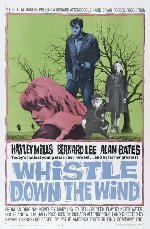
Version 1
Whistle down the Wind (1961-07-Film)
Type de série: FilmThéâtre: *** Film (*** - ***) Durée : Nombre : Première Preview : 25 July 1961
Première: 25 July 1961
Dernière: InconnuMise en scène : Bryan Forbes • Chorégraphie : Aucun • Producteur : Star(s) : Commentaires longs: Le film qui a inspiré Andrew Lloyd Webber. The film was favourably reviewed upon its original release, including praise from The New York Times. The film was nominated for four BAFTA (British Academy of Film and Television Arts) awards:
Best British Actress, Hayley Mills
Best British Film, Bryan Forbes
Best British Screenplay, Keith Waterhouse and Willis Hall
Best Film from any Source, Bryan Forbes.
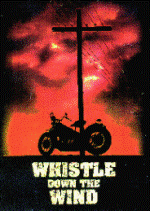
Version 2
Whistle down the Wind (1996-12-National Theatre-Washington)
Type de série: OriginalThéâtre: National Theatre (Washington - Etats-Unis) Durée : 1 mois 4 semaines Nombre : Première Preview : 06 December 1996
Première: 12 December 1996
Dernière: 09 February 1997Mise en scène : Harold Prince • Chorégraphie : Producteur : Star(s) : Commentaires longs: Whistle Down the Wind premiered at the National Theatre in Washington, D.C. on December 12, 1996, starring Davis Gaines as The Man and Irene Molloy as Swallow. It drew mixed reviews, [1] and the Broadway opening that had been scheduled for April 17, 1997, was subsequently cancelled. It was felt that, among other things, it was Harold Prince's direction that had led to its failure. However, the Washington Post review wrote that "Harold Prince brings all his brilliant directing skills to bear on the material, and with Binkley and set designer Andrew Jackness he produces some inventive, often startling staging." It got a huge amount of advance publicity, due to Steinman's status as a popular American songwriter and how strange the combination of Steinman and Lloyd Webber seemed based on Steinman's prior work. The Washington Post review noted "Steinman and Lloyd Webber's differing styles of gothic intensity might have been expected to be mutually enhancing, but in fact they cancel each other out."
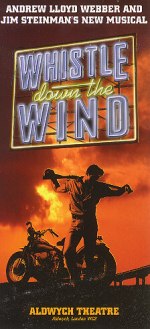
Version 3
Whistle down the Wind (1998-06-Aldwych Theatre-London)
Type de série: Original LondonThéâtre: Aldwych Theatre (Londres - Angleterre) Durée : 2 ans 6 mois 1 semaine Nombre : 1044 représentationsPremière Preview : 22 June 1998
Première: 01 July 1998
Dernière: 06 January 2001Mise en scène : Gale Edwards • Chorégraphie : Anthony Van Laast • Producteur : Star(s) : Avec: Marcus Lovett (The Man), Lottie Mayor (Swallow), Ashley Andrews/Danielle Calvert (Brat), Dean Clish/Ricki Cuttell (Poor Baby), Dean Collinson (Amos), Veronica Hart (Candy), Christopher Howard (Snake Preacher), John Turner (Sheriff), Reg Eppey (Minister), Nicolas Colicos (Darryl), James Graeme (Boone)
Et aussi: Jerome Pradon (The Man), Laura-Michelle Kelly (Swallow)Commentaires : The show has been extensively revised since its tryout in Washington last year. A reworked, and more successful, West End production opened at the Aldwych Theatre on July 1, 1998, starring Marcus Lovett as The Man and Lottie Mayor as Swallow, running for 1044 performances and closing in January 2001. This production was darker than the Washington, D.C. production, and was revised and directed by Gale Edwards, a director who had previously collaborated with Lloyd Webber on an updated production of Jesus Christ Superstar. More than half of the crew also came from Superstar to Whistle.Presse : NICHOLAS DE JONGH of the EVENING STANDARD was scathing saying that Lloyd Webber's musical is "so ludicrous in outline, so unmemorable in song that his admirers may tune out and turn on to something more contemporary."
MICHAEL BILLINGTON of THE GUARDIAN says, "The result, I fear, is so much piffle down the wind."
DAVID BENEDICT of THE INDEPENDENT was not impressed either saying, " The major problem is its failure of tone."
However, the DAILY MAIL says, "It's very, very good".
ROBERT GORE-LANGSTON of THE DAILY EXPRESS says " I found myself both moved and beguiled, damn it. Lloyd Webber has at last come up with a hit for those who don't quite get the point of him."
THE DAILY TELEGRAPH says "This revised version is one of the most heartfelt and touching shows Lloyd Webber has written."
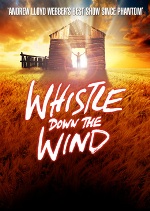
Version 4
Whistle down the Wind (2001-xx-UK Tour 1)
Type de série: UK TourThéâtre: UK Tour ( - Angleterre) Durée : Nombre : Première Preview : Inconnu
Première: Inconnu
Dernière: InconnuMise en scène : Bill Kenwright • Chorégraphie : Henry Metcalf • Producteur : Star(s) : Commentaires longs: In 2001, Bill Kenwright produced and directed his own production of Whistle Down the Wind for a UK tour, starring Tim Rogers as The Man and Katie Rowley Jones as Swallow. He was granted a considerable amount of creative freedom as director, authorized by Andrew Lloyd Webber to make significant changes to the dramatic structure of the musical, including replacing the running parable of Annie and Charlie Christmas told to the children by The Man with a lighter-toned number called "The Gang" (lyrics by Don Black). This version was simpler in design and more focused on the human story than the spectacular visuals of the Aldwych production. The show toured the UK a number of times with several cast changes between 2001 to 2004.Presse : “I was captivated by Whistle Down the Wind. The best musical production I have seen on stage. Simply superb… Go and see it.”
Sunderland Evening Chronicle
“Technically a miracle…vocally, the performers sound like Angels.”
Yorkshire Post, Bradford
“A show with immense heart.”
The Mail on Sunday, Glasgow
“A clutch of melodies crying out to be hummed all the way home.”
Keighley News, Bradford
“This high-quality production works like a charm and looks a treat. The big barn set is spectacular and the cast of principals and children are outstanding.”
Aberdeen Press and Journal
“Hugely entertaining with a gripping tear jerker of a finale that had the first night audience on their feet, cheering.”
Wolverhampton Adnews
“This rock musical spectacular kicked up an almighty storm thanks to catchy songs, strong performances and compelling story.”
Southampton Daily Echo
“It works triumphantly!”
Evening Herald, Plymouth
“Strong emotional scenes. Intense, satisfying, gripping drama.”
Edinburgh Theatre Guide
“A compelling stage show. A wonderful, romanticized, showcase. A Triumph!”
Liverpool Echo
“A winning formula keeps the audience enthralled.”
Leeds Weekly News
“With a talent-loaded cast and spectacular new staging it is even better than the West End version.”
Aberdeen Evening Express
“Absolutely sensational – catch it if you can – it will quite literally take your breath away!”
Woking Review
“An excellent cast, a brilliant set and superb musicians. This spectacular show whistled into Wolverhampton and made the Grand Theatre come alive.”
Wolverhampton Chronicle
“Make no mistake, this is a bona fide good night out!”
Edinburgh Evening News
“This show is fantastic. it is the most moving musical I have seen in a long time, so get your tickets now.”
South Shields Gazette
“It shouldn’t be a case of whistling down the wind, but shouting from the rooftops.”
Sunderland Echo
“Delightful strong performances that are ultimately very moving. Certainly a show worth catching.”
Liverpool Daily Post
“A cracking feel-good family show Oxford Mail No matter what they tell you. Go and see this Andrew Lloyd Webber and Jim Steinman musical. It’s a treat.”
Liverpool Daily Post
“The show is alive and engaging… a stunning stage spectacle.”
Birmingham Evening Mail
“The musical manages to combine epic themes – love, redemption, forgiveness, racism – with intimate storytelling and a string of award-winning songs, including the Boyzone No 1 hit ‘No Matter What’.”
Eastbourne Herald
“One of Lloyd Webber’s most compelling scores. You will leave with a lump in your throat.”
The Journal, Sunderland
“The cast were faultless.”
South Wales Echo

Version 5
Whistle down the Wind (2006-03-Palace Theatre-London)
Type de série: RevivalThéâtre: Palace Theatre (Londres - Angleterre) Durée : 4 mois 2 semaines Nombre : Première Preview : 15 March 2006
Première: 27 March 2006
Dernière: 12 August 2006Mise en scène : Bill Kenwright • Chorégraphie : Henry Metcalf • Producteur : Star(s) : Avec: Tim Rodgers (The Man), Claire Marlowe (Swallow), Emma Hopkins / Henrietta Touquet (Brat), Laurence Belcher/Christopher Thomas (Poor Baby), Garrie Harvey (Amos), Debbie Korley (Candy), Chris Holland (Snake Preacher), Kevin Curtin (Sheriff), David Robbins (Minister), Michael Howard Smith (Boone)Commentaires : This revival was a kind of “fill-in” following the early withdrawal of “The Woman in White”. It was produced on a smaller-scale than the original (in spite of being in a much bigger theatre). This new production was felt to be far less pretentious, simpler, stronger and more heartfelt than the original.Commentaires longs: At the request of Lloyd Webber, Kenwright brought his production of Whistle Down the Wind to the Palace Theatre, London in March 2006, where it played a limited run until August, filling the gap between the closure of another Lloyd Webber musical, The Woman in White and the opening of the Monty Python musical Spamalot. Tim Rogers reprised his acclaimed performance of The Man, and Claire Marlowe, another veteran of the UK tour, reprised the role of Swallow. The critical opinion was mixed, ranging from Michael Billington's 2 star review in The Guardian to Benedict Nightingale's 4 star review in The Times, but virtually all of the national papers agreed that this version was an improvement on Gale Edwards's Aldwych production.

Version 6
Whistle down the Wind (2007-09-US Tour)
Type de série: US TourThéâtre: US Tour ( - Etats-Unis) Durée : Nombre : Première Preview : Inconnu
Première: Inconnu
Dernière: InconnuMise en scène : Bill Kenwright • Chorégraphie : Henry Metcalf • Producteur : Star(s) : Commentaires longs: A tour of Whistle Down the Wind in the US began in Houston, Texas, in September 2007, and ended in February 2008 in Norfolk, Virginia. Planned Los Angeles and San Francisco dates were cancelled.[7][8] The production was directed and produced by Bill Kenwright, who had expressed, in his promotional video for the US tour, his intention to take the show to Broadway.

Version 7
Whistle down the Wind (2010-01-UK Tour 2)
Type de série: UK TourThéâtre: UK Tour ( - Angleterre) Durée : 6 mois Nombre : Première Preview : 20 January 2010
Première: 20 January 2010
Dernière: 24 July 2010Mise en scène : Bill Kenwright • Chorégraphie : Henry Metcalf • Producteur : Star(s) : Commentaires longs: A brand new production started at the Liverpool Empire on 20 January 2010 and moved onto venues including Bristol and Edinburgh. The production, the first in four years, is directed by Bill Kenwright, Musically Directed by David Steadman with choreography by Henry Metcalfe. The show is set to close in Woking on 24 July 2010 after a 6 month run.
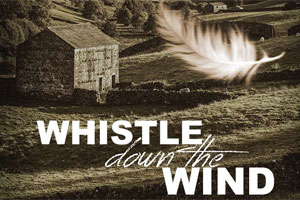
Version 8
Whistle down the wind (2015-01-Union Theatre-London)
Type de série: RevivalThéâtre: Union Theatre (Londres - Angleterre) Durée : 3 semaines Nombre : Première Preview : 28 January 2015
Première: 30 January 2015
Dernière: 21 February 2015Mise en scène : Sasha Regan • Chorégraphie : Producteur : Star(s) : Avec: Callum McArdle, Grace Osborn, Alex James Ellison, Chris Coleman, Kathyrn Hamilton-Hall, Danielle Morris, Romero Clark, Bryan Hodgson, Oliver Stanley, Sebastion Thomas, Joshua Lewindon, Harry Wright, Edward Crann, Sarah Kate Howarth, Imelda Warren-Green, Ana Richardson, Molly Steere and Donna Marsh.
Pas encore de video disponible pour ce spectacle